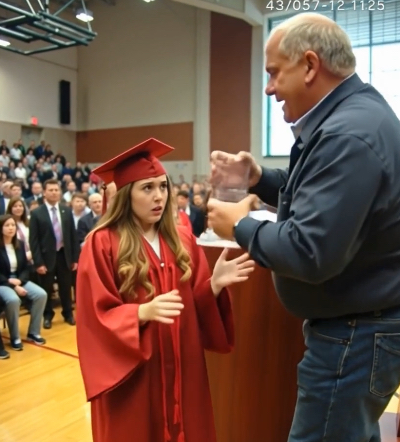
but words failing him. His silence was a wall I couldn’t climb, and it loomed larger than life in our small kitchen. I wanted to scream, to shatter the oppressive quiet, but the exhaustion of the day weighed on me like an anchor. My heart ached for an explanation, for any hint of remorse or understanding. But all I got was the shuffle of his boots as he stood and went to the fridge, pulling out a beer.
The clink of the bottle opening was the only conversation we had. I watched him retreat into the living room, collapsing into his recliner like a shipwrecked sailor. The television flickered on, and I was left standing there, trying to make sense of a world that had just turned upside down.
I retreated to my room, my sanctuary, and let the tears spill. The remnants of the trophy lay in a small trash bin, jagged pieces glinting like broken dreams. I picked up the largest shard, holding it carefully, feeling its sharp edges. It was a tangible reminder of what I had lost—not the trophy itself, but the acknowledgment of my hard work and the silent pride I had hoped to see in Dad’s eyes.
For the next few days, we lived like strangers. I moved through the house like a ghost, my footsteps silent on the wooden floors. Dad kept himself busy with odd jobs around the house, always avoiding my gaze. The silence at home was deafening, a chorus of unspoken words and unresolved anger.
I often found myself replaying that moment in my mind, dissecting every second, trying to understand his actions. Was it jealousy? Anger? Disappointment in a life that hadn’t gone as planned? The questions circled like vultures, picking apart my thoughts until I was left with nothing but bare bones.
But, as the days turned into weeks, a small part of me began to heal. I found solace in the letters and calls from friends who had witnessed that painful moment, their words of support wrapping around me like a warm embrace. Teachers reached out, offering encouragement and reminding me of the strength they saw in me. Slowly, I began to realize that my worth was not tied to anyone’s approval—not even my father’s.
One evening, as I sat at the kitchen table, flipping through college brochures, Dad finally spoke. It was a hesitant, awkward apology, mumbled between sips of coffee. “I didn’t mean to ruin it for you,” he said, his eyes fixed on the table. “I just… it all got too much.”
I looked at him, trying to find the man I once idolized, the father who had taught me to ride a bike and cheered at my soccer games. His eyes were weary, burdened with regrets and unspoken truths.
“I just wanted you to be proud of me,” I said softly, meeting his gaze for the first time in weeks.
“I am,” he replied, his voice cracking like old leather. “I just didn’t know how to show it.”
In that moment, I realized that his silence had been more about his struggles than my shortcomings. It didn’t excuse his actions, but it offered a glimmer of hope that maybe, just maybe, we could rebuild what had been broken. And as we sat there, enveloped in the quiet understanding of our shared imperfections, I felt the first stirrings of forgiveness.